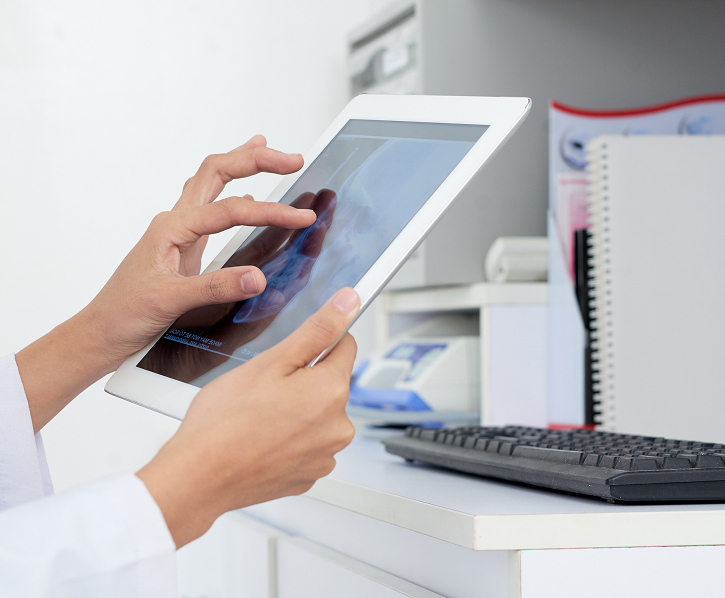
Medical Device Software
Medical Device Software Compliance in Development
Build Reliable Software for Certified Medical Devices
Medical electronics demand the highest standards of safety, performance, and compliance. Whether you’re building diagnostic equipment, patient monitoring systems, or wearable health trackers, your software must operate flawlessly and comply with stringent regulatory frameworks.
It is important to distinguish between standalone software intended for medical purposes and software embedded in a hardware medical device; standalone software operates independently of a hardware device, while embedded software is integral to the hardware device itself. The medtech industry is rapidly evolving, with regulatory frameworks and innovation shaping how medical device manufacturers and medical device companies approach compliance, cybersecurity, and product development.

What We Offer
At Promwad, we provide end-to-end embedded software development for medical devices, aligned with IEC 62304, ISO 13485, EU MDR, and FDA Class I/II requirements. Our experts guide you through the entire lifecycle: from planning and risk assessment to firmware development, testing, and documentation for regulatory submissions.
Embedded Software for Medical Electronics
- Real-time firmware for sensors, motor control, or imaging
- Medical communication protocols: HL7, DICOM, etc.
- Data acquisition and digital signal processing
- GUI/HMI development for touchscreens and wearable displays
- Wireless data sync with smartphones and cloud platforms
Compliance-Aligned Development Lifecycle
- IEC 62304 software safety classification system (A, B, C) for risk-based categorisation
- Risk management (ISO 14971) and traceability matrix creation to address associated risks
- Software documentation for EU MDR and FDA 510(k)
- Unit, integration, and system-level verification & validation (V&V)
- Cybersecurity planning for connected medical devices, including input from external stakeholders
- Implementation of software maintenance processes as required by IEC 62304
- Adherence to quality system regulation and quality management systems (e.g., ISO 13485) for process traceability and compliance
- Involvement of software developers in compliance, risk assessment, and development methodologies
- Use of the classification system to determine the level of rigor needed during development
- Ongoing assessment and mitigation of associated risks throughout the software lifecycle
- Clear definition of the intended purpose of the software for regulatory compliance and approval
- Consideration of performance requirements and their impact on regulatory submissions and device modifications
Compliance-Aligned Development Lifecycle
- Compliance considerations for integrating off the shelf software components
- Clinical evaluation to demonstrate software safety and performance
- Engagement with external stakeholders such as providers, regulatory bodies, and industry partners in cybersecurity and compliance
- Following FDA guidance and proposed regulatory framework for AI/ML-based devices
- Alignment with standards set by international organisations such as ISO
- Compliance with Health Canada and other regulatory agencies for global market access
- Regulation of in vitro diagnostic device and vitro diagnostic device software under EU IVDR and other frameworks
- Application of health software standards (e.g., IEC 81001-5) for cybersecurity and data protection
- Monitoring future trends and their impact on medical device software standards
- Integration of artificial intelligence and machine learning in medical device development and regulatory compliance
- Ensuring safe and effective software and effective software through structured processes
- Fulfilling the responsibilities of medical device manufacturers and medical device company obligations in compliance and best practices
- Understanding the regulatory implications of software intended for medical purposes
- Applying best practices in medical device development processes
Hardware & Platform Support
- Bare-metal MCU and RTOS-based devices (ARM Cortex-M)
- Embedded Linux on NXP i.MX, TI AM62x, and STM32MP1 SoCs
- Secure bootloaders, OTA update systems, and power management
- Interfaces: I2C, SPI, CAN, UART, USB, BLE, Wi-Fi, NFC
UX and Connectivity Integration
- Bluetooth health profiles, companion apps, and APIs
- Qt/QML or LVGL GUI for touchscreens
- Secure storage and encryption (AES, TLS, HIPAA-aligned)
- Battery life optimisation for portable and wearable devices
Supported Device Categories
Wearables & Trackers
ECG patches, temperature monitors
Diagnostic Instruments
Spirometers, ultrasound, analysers
Connected Therapeutics
Drug delivery systems, neurostimulators
Patient Monitoring Devices
Pulse oximeters, BP monitors
Mobile Medical Apps (SaMD)
Remote diagnostics, wellness dashboards
Our Development Workflow
Why Promwad
20 years of experience in embedded systems and certified software
Familiarity with ISO 13485, IEC 62304, ISO 14971, and GDPR/HIPAA
Engineering + compliance teams under one roof
Flexible cooperation: turnkey development or team extension
Expertise in both wearable consumer health and clinical-grade devices
The Medical Device Software Development Process
Developing medical device software is a highly structured process designed to ensure that every product is safe, effective, and compliant with regulatory requirements. The software development process typically begins with thorough planning, where requirements are defined and a roadmap is established. This is followed by detailed design, careful implementation, testing, and ongoing maintenance.
Risk Management in Medical Device Software
Risk management is a cornerstone of medical device software development, ensuring that potential hazards are systematically identified, assessed, and controlled throughout the product lifecycle. Medical device companies must establish a comprehensive risk management process that includes hazard analysis, risk assessment, and the implementation of effective risk controls.
Cybersecurity in Medical Devices
Medical Device SoftwareTesting
Let’s Build Medical Devices That Perform and Comply

Let’s turn your infotainment vision into a scalable reality!
Drop us a line about your project! We will contact you today or the next business day. All submitted information will be kept confidential.
